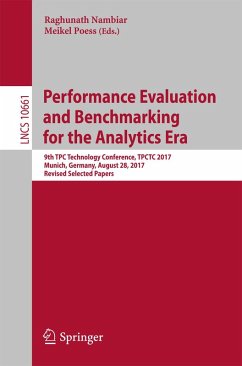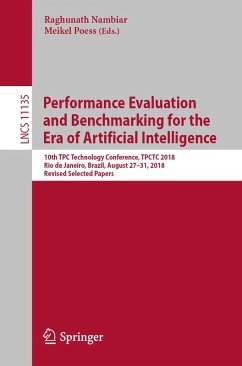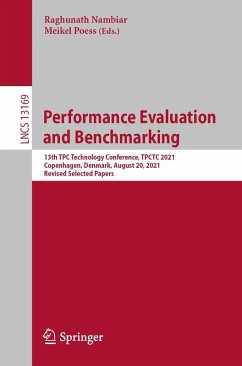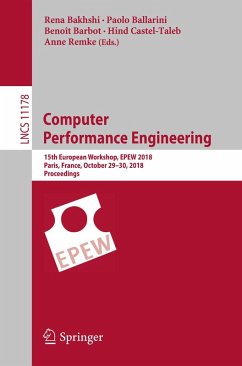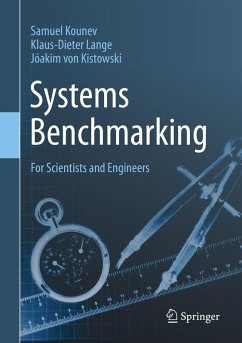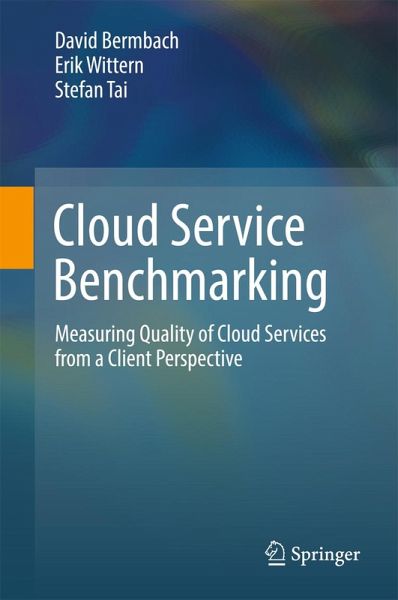
Cloud Service Benchmarking (eBook, PDF)
Measuring Quality of Cloud Services from a Client Perspective
Versandkostenfrei!
Sofort per Download lieferbar
56,95 €
inkl. MwSt.
Weitere Ausgaben:

PAYBACK Punkte
28 °P sammeln!
Cloud service benchmarking can provide important, sometimes surprising insights into the quality of services and leads to a more quality-driven design and engineering of complex software architectures that use such services. Starting with a broad introduction to the field, this book guides readers step-by-step through the process of designing, implementing and executing a cloud service benchmark, as well as understanding and dealing with its results. It covers all aspects of cloud service benchmarking, i.e., both benchmarking the cloud and benchmarking in the cloud, at a basic level.The book i...
Cloud service benchmarking can provide important, sometimes surprising insights into the quality of services and leads to a more quality-driven design and engineering of complex software architectures that use such services. Starting with a broad introduction to the field, this book guides readers step-by-step through the process of designing, implementing and executing a cloud service benchmark, as well as understanding and dealing with its results. It covers all aspects of cloud service benchmarking, i.e., both benchmarking the cloud and benchmarking in the cloud, at a basic level.
The book is divided into five parts: Part I discusses what cloud benchmarking is, provides an overview of cloud services and their key properties, and describes the notion of a cloud system and cloud-service quality. It also addresses the benchmarking lifecycle and the motivations behind running benchmarks in particular phases of an application lifecycle. Part II then focuses on benchmark design by discussing key objectives (e.g., repeatability, fairness, or understandability) and defining metrics and measurement methods, and by giving advice on developing own measurement methods and metrics. Next, Part III explores benchmark execution and implementation challenges and objectives as well as aspects like runtime monitoring and result collection. Subsequently, Part IV addresses benchmark results, covering topics such as an abstract process for turning data into insights, data preprocessing, and basic data analysis methods. Lastly, Part V concludes the book with a summary, suggestions for further reading and pointers to benchmarking tools available on the Web.
The book is intended for researchers and graduate students of computer science and related subjects looking for an introduction to benchmarking cloud services, but also for industry practitioners who are interested in evaluating the quality of cloud services or who want to assess key qualities of their own implementations through cloud-based experiments.
The book is divided into five parts: Part I discusses what cloud benchmarking is, provides an overview of cloud services and their key properties, and describes the notion of a cloud system and cloud-service quality. It also addresses the benchmarking lifecycle and the motivations behind running benchmarks in particular phases of an application lifecycle. Part II then focuses on benchmark design by discussing key objectives (e.g., repeatability, fairness, or understandability) and defining metrics and measurement methods, and by giving advice on developing own measurement methods and metrics. Next, Part III explores benchmark execution and implementation challenges and objectives as well as aspects like runtime monitoring and result collection. Subsequently, Part IV addresses benchmark results, covering topics such as an abstract process for turning data into insights, data preprocessing, and basic data analysis methods. Lastly, Part V concludes the book with a summary, suggestions for further reading and pointers to benchmarking tools available on the Web.
The book is intended for researchers and graduate students of computer science and related subjects looking for an introduction to benchmarking cloud services, but also for industry practitioners who are interested in evaluating the quality of cloud services or who want to assess key qualities of their own implementations through cloud-based experiments.
Dieser Download kann aus rechtlichen Gründen nur mit Rechnungsadresse in A, B, BG, CY, CZ, D, DK, EW, E, FIN, F, GR, HR, H, IRL, I, LT, L, LR, M, NL, PL, P, R, S, SLO, SK ausgeliefert werden.



